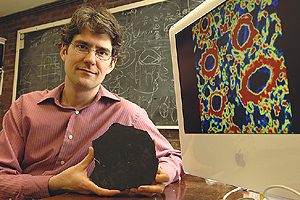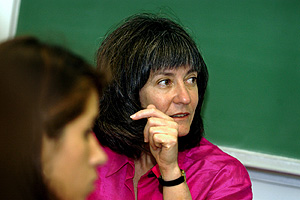Chicago in the News
The Chronicle’s biweekly column Chicago In the News offers a digest of commentary and quotations by a few of the University faculty members, students and alumni who have been headlining the news in recent weeks. Chicago faculty members are some of the most frequently quoted experts, so space allows publishing references to only selected examples.
To read many of the full newspaper articles mentioned in this column, visit the In the News column at the University News Office Web site: http://www-news.uchicago.edu/.
It’s official: fossil was a fungus
 C. Kevin Boyce Photo by Lloyd DeGrane | |
Research conducted by C. Kevin Boyce, Assistant Professor in Geophysical Sciences and the College, on the carbon isotopes of a 400-million-year old fungus called prototaxites was featured in several articles published between Monday, April 23, and Tuesday, May 1, in The Washington Post, the Chicago Sun-Times, the Montreal Gazette, the Daily Telegraph and The New York Times. Analyses of the prototaxites fossil, which Boyce and geophysical scientists at two other institutions conducted, proved that the organism, which could grow up to 25-feet tall, was in fact a fungus. Their study results were published in the academic journal Geology. Before this study, scientists had debated for a century over whether the organism should be classified as a conifer, lichen, algae or fungus. “No matter what argument you put forth, people say, ‘well, that’s crazy.’ That doesn’t make any sense. A 20-foot tall fungus doesn’t make any sense. Neither does a 20-foot-tall algae make any sense but here’s the fossil,” Boyce said in the Wednesday, April 25 Daily Telegraph article.
Flu bug backs down
Stephen Weber, Assistant Professor of Infectious Diseases in Medicine, was quoted in a Tuesday, April 24 Chicago Tribune story reporting on the latest flu season and its positive results. Flu vaccine production and distribution increased after vaccine shortages occurred and demand grew in past flu seasons. Increased production to meet the demand and new federal health recommendations for those at high risk may or may not be why there have been less serious cases of influenza. “It’s very tempting to conclude that what we’ve seen this year is at least affected by the new outreach to get more vaccine out, especially to children,” said Weber. “There’s no way to predict that next year won’t be a horrible flu season.”
The precursor to language
 Susan Goldin-Meadow | |
The evolution of language, which is being studied through gestures used by apes, was the topic of a National Public Radio segment broadcast Tuesday, May 1 on WBEZ’s Morning Edition program. Susan Goldin-Meadow, the Bearsdley Ruml Distinguished Service Professor in Psychology and the College, who studies gesturing and its effects on communication, language and learning, commented on the ape studies, which showed that apes used gestures to communicate different things in different situations, making gestures flexible for communication. This suggests, she said, that gestural communication may be a precursor to human language. “These species can be modifying their gestures and perhaps teaching their gestures to one another or learning their gestures,” said Goldin-Meadow, “so that it has a sort of flexibility that might allow the communication system to grow ahead of it. It looks like it may be the beginning.”
Democrats building momentum
Congress’ current legislative push to begin pulling U.S. troops out of Iraq by Monday, Oct. 1, surpasses congressional efforts that were made to end the Vietnam War, according to an Associated Press story, carried on the newswire Tuesday, May 1. William Howell, Associate Professor in the Irving B. Harris Graduate School of Public Policy Studies and an expert on war powers, noted that no matter what the historical significance is regarding the recent congressional action, the Iraq war’s unpopularity is strengthening the Democrats’ opposition to President Bush’s war policy. “It establishes this marker so that not now, but six months from now, Democrats can have the momentum to (override) a presidential veto,” if the war is at that time continuing to go badly. “Just because it doesn’t pass doesn’t mean it’s not of consequence,” added Howell.
The lyrics and the damage done
The depiction of women in popular hip-hop music was up for discussion and debate at a recent University-sponsored conference, called “Does Hip-Hop Hate Women?” Though planned months before the controversy involving radio host Don Imus—who was fired by CBS for using derogatory words that have appeared as lyrics in hip-hop songs—the conference provided a forum to explore more deeply who is accountable for producing music that perpetuates negative stereotypes of young, black women. Articles on the conference, which was co-sponsored by Chicago’s Center for the Study of Race, Politics and Culture and Columbia College, appeared in the Monday, April 30 Chicago Tribune and in the Daily Herald.
Art fair shocked back to life
Susanne Ghez, Executive Director of the Renaissance Society at the University, was quoted in a Thursday, April 26 story that appeared in the Chicago-Sun Times. A revived Art Chicago—a major art fair purchased by the Merchandise Mart last year after its near death—is making a comeback as a show to be seen. Ghez confirmed that the fair is making a name for itself—again. “There’s a real buzz,” she said, in the Sun-Times. “When I was in New York at the Armory Show, people were talking about Chicago again.”
Natural instincts
Two University students, first-year Rachel McFadden and third-year Zachary Trayes-Gibson, were highlighted in stories that reported on the mugging of Carol Moseley Braun in Hyde Park. The two students came to the former Senator’s aid during an attempted robbery and scared her attacker away. “You hear a woman screaming, you don’t think twice. You go and help,” said McFadden, in a Chicago Sun-Times story. Said Moseley Braun in a Tuesday, May 1 Chicago Tribune story: “When something like this happens, when one person’s right decision makes a difference, it’s humbling. It reminds you of how big a difference one person can make.”
Yes, she’s for real
Mari Topel, a University Laboratory Schools’ High School senior, was featured in the Thursday, April 26 Chicago Sun-Times. Topel, whose father, Robert Topel is the Isidore Brown & Gladys J. Brown Professor of Urban and Labor Economics in the GSB, is the only female player on one of the state’s 665 varsity baseball teams. Keronn Walker, Topel’s coach and a former professional player for the Kansas City Royals, said Topel proves her skillful playing on the field, even though her opponents make jokes about her gender. “Sometimes it comes as a shock to the other teams,” said Walker. “They think they can take advantage of her. They look at it as a joke until the game starts. Then they find out she is for real.”
Banking on consumer business

Raghuram Rajan
Raghuram Rajan, the Eric J. Gleacher Distinguished Service Professor of Finance in the Graduate School of Business, commented in a Tuesday, April 24 Seattle Times story about two recent bank mergers involving the purchase of ABN Amro. Bank of America purchased ABN Amro’s LaSalle Bank based in Chicago, and Barclays in London purchased the remaining portion of the Dutch-owned ABN Amro. Rajan, who formerly worked with the International Monetary Fund, said both mergers are a move to secure more consumer business. “There is $4 trillion in consumer deposits in China, and this gives Barclays a chance at a piece of the action,” said Rajan. He noted that Bank of America executives believe they can attract more consumer business than LaSalle Bank did.
![[Chronicle]](/images/sidebar_header_oct06.gif)